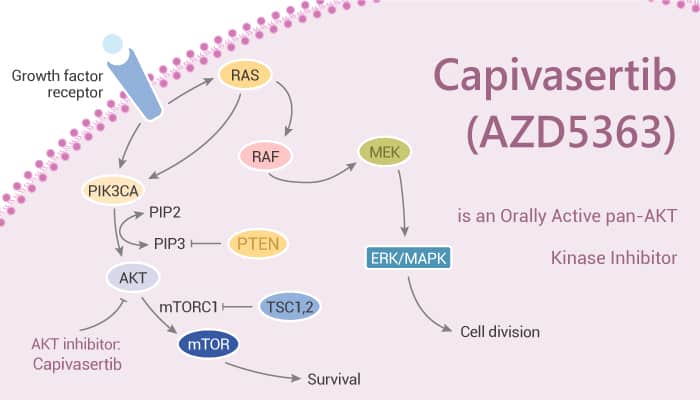Akt/PKB (Protein kinase B), usually called Akt, is a serine/threonine protein kinase with antiapoptotic activity. In addition, Akt consists of three isoforms: PKBα/Akt1, PKBβ/Akt2 and PKBγ/Akt3. Catalytically active Akt regulates the function of numerous substrates involved in cell survival, growth, proliferation, metabolism and protein synthesis. Akt possesses a protein domain known as a PH domain, or pleckstrin homology domain. This domain binds to phosphoinositides with high affinity. Moreover, the activation of Akt is also one of the most frequent alterations observed in human cancer and tumor cells. Therefore, it is one of the most promising targets for cancer therapy, with a considerable platform of preclinical validation.
Capivasertib (also known as AZD5363) is a potent and orally active pan-AKT kinase inhibitor with a potency of 10 nM or less for inhibiting Akt1, Akt2 and Akt3. Moreover, Capivasertib inhibits phosphorylation of AKT substrates in cells. This compound potently inhibits the proliferation of multiple solid and hematologic tumor cell lines. Especially, breast cancers cells show the highest frequency of sensitivity. In vivo, in BT474c xenografts, oral administration of Capivasertib decreases the phosphorylation levels of PRAS40, GSK3β, and S6 in a dose- and time-dependent manner. Similarly, chronic oral dosing of Capivasertib resulted in dose-dependent growth inhibition of xenografts from various tumor types, including the HER2+ breast cancer model that is resistant to Trastuzumab.

To sum up, Capivasertib is a potent and orally active AKT inhibitor with pharmacodynamic activities in vitro and in vivo in multiple solid and hematologic tumors.
References:
[1] Barry R Davies, et al. Mol Cancer Ther. 2012 Apr;11(4):873-87.